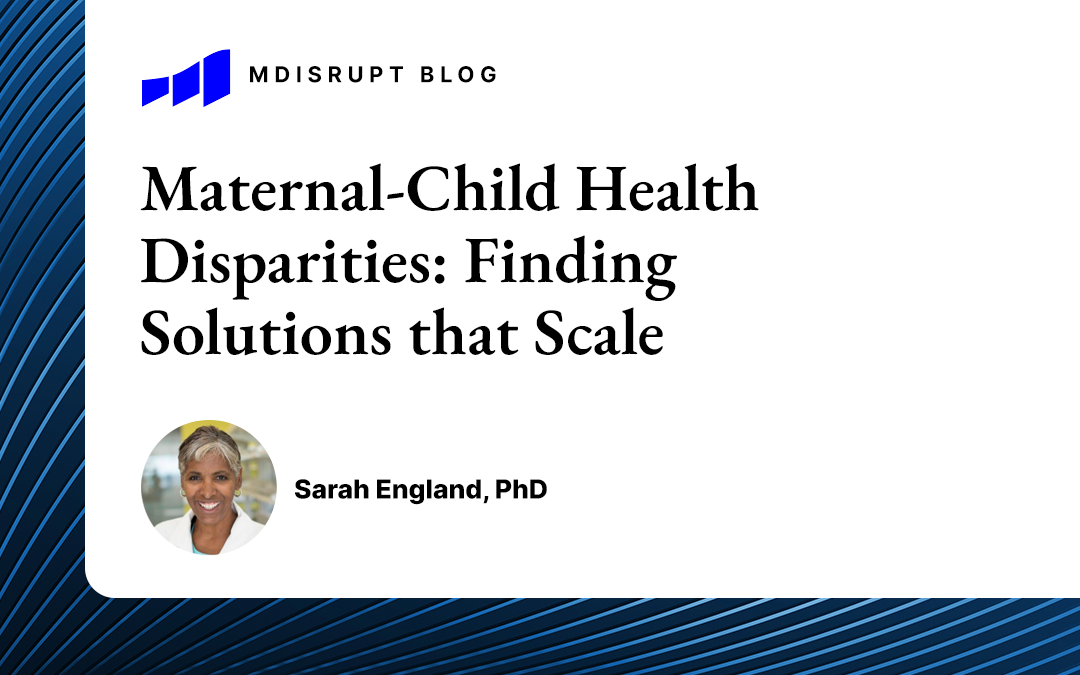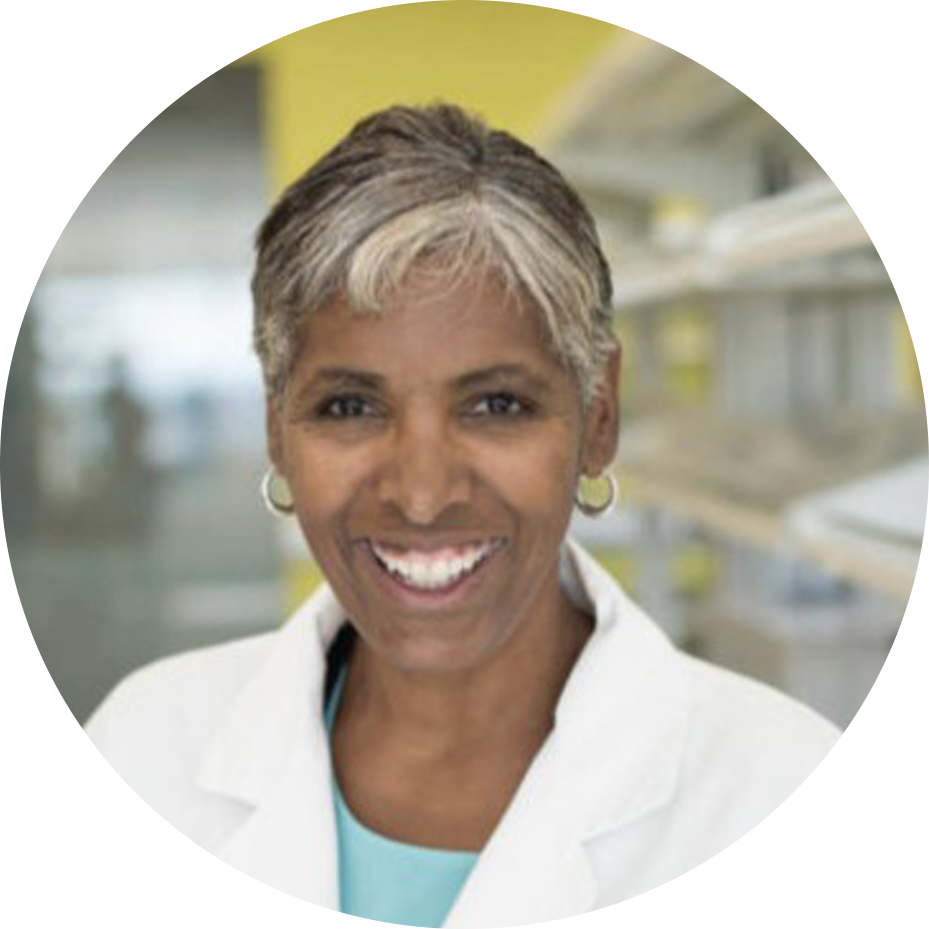
Real-world Innovations to Reduce Maternal and Child Health Disparities

Meet Sarah England, PhD, the
Alan A. and Edith L. Wolfe professor of medicine and vice-chair of research at Washington University School of Medicine’s Department of Obstetrics and Gynecology.

Dr. England has devoted her academic research career to maternal and child health, with the goal of reducing disparities and poor outcomes across affected communities. She has been a champion of simple and elegant solutions that, at scale, are poised to make a big impact. Partnering with digital health leaders on innovative solutions can have a global reach and feed into a system where the benefit can be felt across generations.
Maternal and child health disparities today
MDisrupt: Can you describe the current state of health disparities for maternal and child health in the US?
Sarah England: Women of color are not faring well in terms of maternal health outcomes compared to white women. Pregnancy-related death is defined as the death of a woman during pregnancy or within one year of the end of pregnancy; a complication of that pregnancy; or a chain of events initiated by the pregnancy. The statistics are staggering. Black, American Indian, and Alaska Native women are two to three times more likely to die from pregnancy-related causes than white women, according to the Centers for Disease Control and Prevention.
It’s a significant issue and it’s about time that we address it. Many people think it’s due to socioeconomic status, but this is not true. Black women with at least a college degree are still 5.2 times more likely to face these consequences compared to their white counterparts.
Building momentum for change
MDisrupt: How are maternal and child disparities being addressed by the health system and government entities?
Sarah England: Most pregnancy-related deaths are preventable and many of the causes of death can be addressed. Women of color face higher rates of stress associated with situational experiences of racial discrimination in the health system. A well-known example is Serena Williams. She knew that she had a complication from her pregnancy and was not believed by the medical professionals that were caring for her. This happens to Black women more commonly than it does to white women. This is something that we can really address by listening to women during their pregnancy.
And healthcare professionals have to be more cognizant of listening to women of color. Medical schools are developing curricula bringing more attention to issues of this nature. The federal government, especially funding agencies, are realizing that we need to address health disparities more than we have in the past. So the tides are changing. We are realizing that this is not good for the future: In order to reduce the trends in maternal and child health, we have to be much more aware of how we treat patients, how we study them epidemiologically and have a greater focus on those that are carrying the burden of disease.
In summary, we must implement standardized protocols in quality improvement initiatives, especially among facilities that serve disproportionately affected communities We need to identify and address implicit bias in healthcare that would improve patient-provider interactions, health communication, and health outcomes, and there needs to be a greater focus by funding agencies to address racial disparities.
A call to action for digital health leaders
MDisrupt: Many in the MDisrupt audience are entrepreneurs who have access to capital, technology, and engineers to build solutions. How can we help?
Sarah England: There is no shortage of good ideas, but often existing ideas remain stuck in “innovation bottlenecks” as they struggle for attention, funding, or the means of implementation. Healthtech founders can help lift us out of the bottleneck and bridge that gap from academia to commercial.
Fortunately, many digital health entrepreneurs are not only highly innovative but also have a desire to make a social impact. And solutions can be pretty simple. For example, we know that the twelve weeks after childbirth (fourth trimester) is a key window of opportunity to provide healthcare to mothers and babies. However, we often do not focus on the immediate post-pregnancy period. My colleagues and I have talked about getting a mobile unit that could go to underserved or remote areas and check in on new mothers. We could provide women access to services to help their emotional well-being, provide contraception and talk to them about birth spacing, ensure they are getting enough sleep, provide help with medications, and prevent substance abuse, and make sure they have physically recovered from childbirth. This relatively easy solution could make exceptional strides in maternal and child health, especially during this critical fourth trimester period.
Building better and more effective information-gathering systems that connect across all parts of our country is also an area where tech solutions are vital. Many people in remote and underserved communities are routinely left behind. And not all states collect information on race, ethnicity, income, and health insurance status because there are no national standards for data collection and reporting of maternal mortality statistics. Such data are critical for recognizing and understanding disparities, and without them, there has been insufficient accountability for maternal mortality.
Motivating for change
MDisrupt: How do you motivate healthtech entrepreneurs to innovate in maternal and child health?
Sarah England: Investors are interested in companies with broad portfolios and a message around social good. It’s a great time to go into maternal child health for this reason because improving maternal health improves child health and ultimately family health. It’s a feed-forward system that has long-term gains.
Another aspect around innovation is this concept of academia and companies working together to solve big problems. When I started my career, it was really important to be independent and have your own ideas and solutions. Now it’s really gone to “team science” and working with others to move your ideas forward. Also, women are pursuing technological fields. Oftentimes, they have children and raise awareness of this issue and push for robust solutions. There is going to be great innovation in this space in the years to come.
Passion-forward
MDisrupt: What advice can you give to women on their career and personal journeys?
Sarah England: It’s about following your passion. My original career path was cardiovascular sciences, not women’s health. Then I read a paper about preterm birth and felt compelled to connect with people in the field and find out more. I ended up going into a neonatal intensive care unit (NICU) with a friend of mine who was an NICU nurse. I saw a baby who had been born at six months and was being kept alive by multiple machines. It was heart-wrenching. I talked to the mother of the child and she blamed herself, even though the medical professionals didn’t know why she delivered the baby early. It made me realize that we don’t have all the answers, and you need innovative, creative minds in this space. So my advice is to follow opportunities because they may end up changing your course in life and opening up a chance to follow your interests and passions.
For women interested in connecting with other women in health, there’s a group that I’m part of called the Women’s Health Collaborative. The goal of this group is to support women in the field by networking and finding others to connect with who can help you move your ideas forward. You just have to be fearless and be ok not knowing everything. It’s very rewarding when you get to where you want to be.
Parting wisdom
MDisrupt: What parting wisdom can you give digital health entrepreneurs?
Sarah England: First and foremost, we need to raise awareness that maternal health is key for child health, and often the health of the entire family. Addressing maternal health issues has long-lasting health benefits across many generations. Second, you can partner with reproductive health researchers and clinicians. For example, we are partnering with engineers to develop devices needed for the care of women during pregnancy. We are very interested in partnering with other innovators with a sincere desire to improve maternal/child health.
At MDisrupt we believe that the most impactful health products should make it to market quickly. We help make this happen by connecting digital health innovators to the healthcare industry experts and scientists they need to responsibly accelerate product development, commercialization, adoption, and scale.
Our expert consultants span the healthcare continuum and can assist with all stages of health product development: This includes regulatory, clinical studies and evidence generation, payor strategies, commercialization, and channel strategies. If you are building a health product, talk to us.
